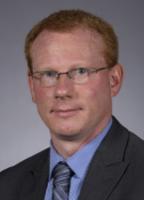Q&As with Dave Andersen a Associate Professor of United States Politics, SGIA

In this Q&A, Dave Andersen, Associate Professor of US Politics at Durham University, discusses his journey from the US to Durham and contrasts the teaching of US politics in the UK versus the US. He highlights Durham's global perspective, fostering critical thinking and independent research, and the benefits of Durham’s diverse, proactive environment. He also outlines key advantages for international students, particularly in gaining a global understanding of political issues.
1. Hi! Could you please briefly walk us through the professional journey that brought you to Durham University?
I was working in Iowa when I applied to Durham, and honestly did not expect to take a position here even if it was offered. I was seeking a move to the east coast of the US to be closer to family but saw the open position at Durham University (which I had never heard of before) that fit my skills and thought that it might be an opportunity to at least visit the UK for an interview. I did get flown out for an interview and was amazed at the charm and beauty of Durham. I spent two days here and when I returned to the US I gave real thought to what a move to the UK would be like. I compared my options and realised that Durham presented more opportunities and would be better for my family in the longrun than staying in the US did. I moved here in 2019 and have no intentions to return to the US again (at least not for work).
2. Based on your experience studying and teaching in the US, how do you think Durham University's approach to teaching US politics differs from that of American institutions?
The prime difference between teaching US politics in the UK is the opportunity to approach the subject with less personal investment with politics and a greater ability to compare the US system with other forms of government. When teaching politics in the US, students often are politically active and aware (which is great) but also come to class with strongly ingrained beliefs and preferences. This can lead to bitter discussions, where students defend their political beliefs rather than engaging in a real debate of ideas. They also have typically have no experience or knowledge of other systems of governance, limiting what we can discuss and how we can approach complex problems. At Durham, we are more able to consider the various political positions presented with less personal involvement. Having students from around the globe also helps compare the American system to those of France, Germany, China, India, and of course the United Kingdom. The students bring much more to the table during discussions and can share novel ideas and experiences from their own backgrounds. These two features help to explore the politics of the United States with greater depth and objectivity.
3. What aspects of Durham’s School of Government and International Affairs (SGIA) do you think contribute to fostering not just academic excellence, but also the development of well-rounded citizens?
One of the key features of the the SGIA experience that helps move beyond academic excellence (which is important!) is the availability of clubs and activities that focus on politics and governance. These groups, such as the Foreign Affairs Society and the Women in Politics Society, allow students to take what they have learned in the classroom and apply it in a real way to understanding and influencing events in the real world. Durham students are extremely proactive in engaging with the real world, which provides them the experience and confidence to become active, engaged citizens for the future.
4. How does Durham’s emphasis on independent research prepare students for real-world challenges in political analysis and policy-making?
Durham’s focus on a “learning and teaching” environment forces students to become proactive in their approach to learning. While required readings and classroom teaching presents information and context for students, their education relies upon them independently seeking out more information and resources on their own. This teaches students how to learn independently, a crucially important skill for future life. When they then transition into fulltime employment post-Durham, they already have the skills and confidence necessary to overcome the challenges they will face.
5. What would you say are the key benefits for international students considering postgraduate studies at Durham, especially in comparison to studying in the US?
There are two key benefits that I see for international students at Durham. First is the condensed timeframe to earn a PGT degree, taking just one year rather than the typical two in the US. This greatly reduces the time and cost of earning a degree. Second, studying at Durham truly provides a global perspective rather than an American perspective. Durham has students and staff from all over the world, which contributes to a vibrant and diverse approach to learning and thinking about political events. American institutions typically provide a singular American perspective, which is useful but limiting to the US context. Durham students are much better prepared to move into the global workforce and contribute to the global political debate. An American PGT student is prepared for the American workforce but a Durham PGT is prepared for the world.
6. Having taught at Iowa State, how do you think an environment like Durham’s enhances students’ understanding of global political issues?
Durham students encounter a much wider variety of people, experiences, ideas, and opinions than American-trained students do. Our classrooms in Durham draw from a wide variety of national origins, providing a much greater perspective on the world and experience with different governing systems and societies. Durham students discuss political ideas and events from a broader array of viewpoints, which both enriches discussions and challenges opinions. This also helps students to understand the motivations behind various political actors from around the globe and not just simplify world events to fit simple understandings of world politics.

